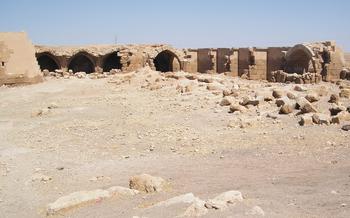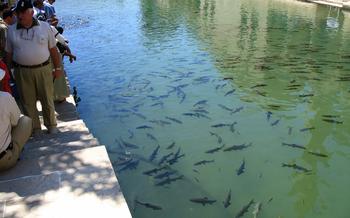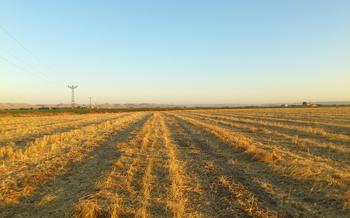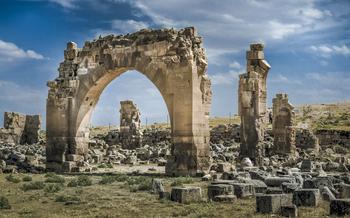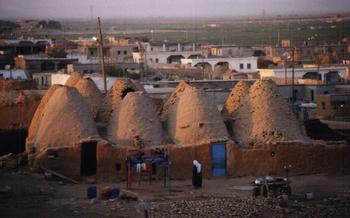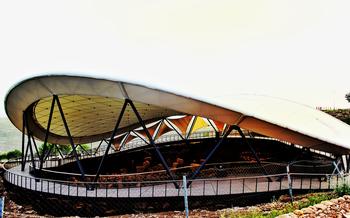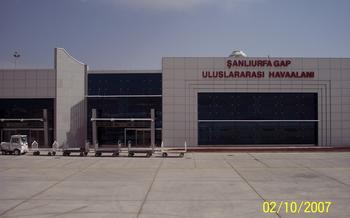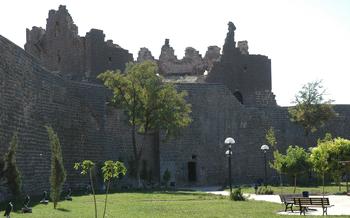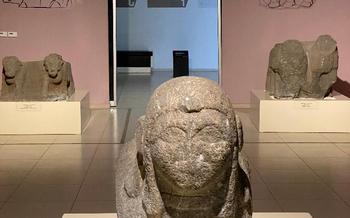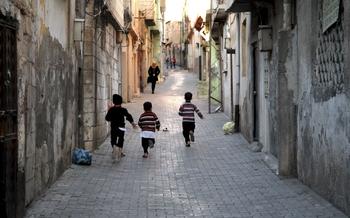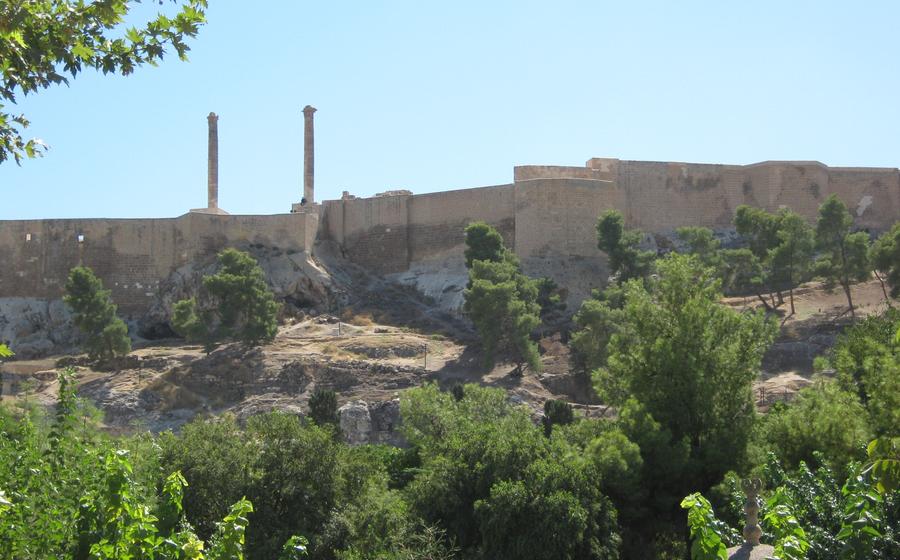
Urfa Castle (Şanlıurfa Kalesi)
- The History of Şanlıurfa Castle
- Exploring the Castle Grounds
- Religious Significance of the Castle
- The Museums Within the Castle
- Legends and Folklore Surrounding the Castle
- Tips for Visiting the Castle
- Exploring the City of Şanlıurfa
- Transportation and Accessibility
- Accommodation and Where to Stay
- Shopping and Local Markets
- Food and Dining Experiences
- Safety and Cultural Considerations:
The History of Şanlıurfa Castle
Şanlıurfa Castle stands as a testament to the rich and tumultuous history of the city of Şanlıurfa. Built on a strategic hilltop overlooking the city, the castle has witnessed the rise and fall of civilizations, each leaving their mark on its architectural tapestry.
The earliest traces of the castle date back to the 3rd millennium BC, when the Hurrians constructed a fortress to protect their kingdom of Mitanni. The Assyrians later expanded the fortress and used it as a base for their military campaigns. The Romans, who conquered the region in 64 BC, further fortified the castle and named it "Edessa."
In the 7th century AD, the Arabs conquered the city and renamed it "Urfa." They extensively rebuilt the castle, adding new towers, walls, and a moat. The castle became the seat of the Umayyad dynasty, which ruled over a vast empire stretching from Spain to India.
After the fall of the Umayyads, the castle passed into the hands of various Muslim dynasties, including the Seljuks, the Mongols, and the Ottomans. Each dynasty made modifications and additions to the castle, reflecting their own architectural styles and defensive needs.
The castle's strategic location and its impressive fortifications made it a formidable stronghold that withstood numerous sieges and attacks throughout its history. It finally fell to the British in 1917 during World War I, but was retaken by the Turkish forces after the war.
Today, Şanlıurfa Castle stands as a symbol of the city's rich history and cultural heritage. It has been meticulously restored and transformed into a museum, showcasing artifacts from various periods of its existence. Visitors can explore the castle's imposing walls, towers, and courtyards, and immerse themselves in the fascinating history of this ancient fortress.
Exploring the Castle Grounds
The Urfa Castle stands as a testament to the ingenuity and architectural prowess of its builders. Its imposing walls, adorned with intricate carvings and inscriptions, enclose a sprawling complex that invites exploration. Visitors can enter through the main gate, which leads to a series of courtyards, barracks, and other buildings.
The courtyards, once bustling with the activities of soldiers and servants, now offer a serene ambiance. Visitors can wander through these open spaces, admiring the architectural details and soaking in the history that permeates the air. The barracks, once home to the castle's defenders, have been converted into exhibition spaces, showcasing artifacts and providing insights into the lives of the castle's former occupants.
Ascending the castle's ramparts, visitors are rewarded with breathtaking panoramic views of the city and its surroundings. The vast expanse of the landscape unfolds before their eyes, revealing the rich tapestry of history and culture that has shaped this region. From this vantage point, visitors can truly appreciate the castle's strategic location and its role as a guardian of the city.
Religious Significance of the Castle
The Urfa Castle holds immense religious significance, particularly for followers of Islam and Christianity. It is believed to be the birthplace of the Prophet Abraham, a revered figure in both religions. According to tradition, Abraham was born in a cave located within the castle grounds. This cave, known as the Cave of Abraham, is a sacred site and a popular destination for pilgrims from around the world.
The presence of the Cave of Abraham within the castle has transformed it into a pilgrimage site for both Muslims and Christians. Devotees visit the cave to pay homage to Abraham and to seek blessings. The cave is adorned with intricate carvings and inscriptions that depict scenes from Abraham's life, adding to its religious significance.
The religious importance of the Urfa Castle has played a crucial role in shaping the city's cultural heritage. Şanlıurfa is known for its religious tolerance and diversity, with people of different faiths living together in harmony. The city's rich history and cultural tapestry are deeply intertwined with the religious significance of the castle.
The Museums Within the Castle
Within the walls of Urfa Castle, visitors can delve deeper into the region's rich history and culture by exploring two remarkable museums: the Şanlıurfa Museum and the Mosaic Museum. The Şanlıurfa Museum houses a diverse collection of artifacts unearthed from the castle grounds, providing a tangible connection to the site's past. From ancient pottery and tools to intricate jewelry and sculptures, these exhibits offer insights into the daily lives and artistic traditions of civilizations that once called the castle home.
The highlight of the museum is undoubtedly the collection of artifacts related to the Prophet Abraham, including a stone believed to bear his footprints. The museum's displays also shed light on the region's significance as a crossroads of cultures, showcasing influences from civilizations such as the Assyrians, Romans, and Byzantines.
Adjacent to the Şanlıurfa Museum is the Mosaic Museum, a treasure trove of stunning mosaics discovered during excavations in the city. These intricate artworks, dating back to the Roman and Byzantine periods, depict scenes from mythology, daily life, and religious narratives. The museum's collection includes the famous "Gypsy Girl" mosaic, an iconic symbol of Şanlıurfa's cultural heritage.
These museums, housed within the ancient walls of Urfa Castle, offer a unique opportunity to explore the region's rich tapestry of history, art, and culture. Visitors can trace the footsteps of ancient civilizations, admire the artistic masterpieces of the past, and gain a deeper understanding of the significance of this remarkable site.
Legends and Folklore Surrounding the Castle
The imposing Urfa Castle has inspired a rich tapestry of stories and legends that have become an integral part of the local culture and identity. Tales of hidden treasures buried within the castle walls, secret passages leading to forgotten chambers, and apparitions of ancient spirits add to its allure and mystique.
One of the most enduring legends is that of the lost treasure of King Nimrod, an ancient ruler said to have hidden vast riches within the castle. Over the centuries, many have attempted to find this treasure, but none have succeeded, and it remains a source of speculation and fascination.
Another tale tells of a secret tunnel connecting the castle to a nearby lake, known as the "Tunnel of Tears." According to legend, the tunnel was built by a heartbroken princess who used it to escape the castle and reunite with her lover. Visitors can still see the entrance to the tunnel, although it is now sealed off.
These legends and stories have been passed down through generations and have helped shape the local culture and identity of Şanlıurfa. They add a layer of mystery and intrigue to the castle, making it a place of not only historical but also cultural significance.
Tips for Visiting the Castle
For an optimal experience, visit the castle during the spring or fall when the weather is pleasant, avoiding the scorching summer heat. Allow at least two to three hours to thoroughly explore the castle grounds, its museums, and the stunning city views from its ramparts. Dress modestly and respectfully, as the castle is a sacred site for many. Comfortable footwear is recommended for navigating the uneven terrain within the castle. Guided tours are available to provide in-depth insights into the castle's history and significance, enhancing your understanding and appreciation of this ancient monument.
Exploring the City of Şanlıurfa
Beyond the majestic Urfa Castle, the city of Şanlıurfa offers a wealth of cultural and historical treasures waiting to be discovered. For history enthusiasts, a visit to the Göbekli Tepe archaeological site is a must. This ancient temple complex, dating back to the 10th millennium BCE, predates the pyramids of Egypt and Stonehenge and provides a glimpse into the origins of human civilization.
For those seeking spiritual enlightenment, the city's Grand Mosque, with its stunning architecture and serene atmosphere, is a place of worship and contemplation. The city's bazaars and markets are a feast for the senses, offering a vibrant tapestry of colors, aromas, and sounds. From traditional textiles and copperware to aromatic spices and delectable treats, there's something for every taste and budget.
Şanlıurfa's culinary scene is not to be missed. Indulge in mouthwatering kebabs, savory çiğ köfte, and the local specialty, lahmacun, a crispy flatbread topped with minced meat and vegetables. Don't forget to try the region's famous pistachio-stuffed baklava, a sweet delight that will leave you craving for more.
Transportation and Accessibility
Reaching Şanlıurfa is a breeze, with several transportation options available. If you prefer air travel, the city boasts its own airport, Şanlıurfa GAP Airport (GNY), which offers direct flights from major cities within Turkey and neighboring countries. Once you arrive at the airport, you can easily hop on a taxi or rent a car to get to the city center.
For those who enjoy the scenic route, traveling by road is an excellent option. Şanlıurfa is well-connected by highways, making it accessible from various parts of Turkey. You can embark on a road trip and soak in the beautiful Turkish landscapes along the way.
If you prefer a more leisurely mode of transport, trains are a great choice. Şanlıurfa has a railway station that offers connections to major cities in Turkey. This option allows you to relax and enjoy the journey while admiring the passing countryside.
Once you're in Şanlıurfa, getting around is a breeze. The city has a reliable public transportation system, including buses and minibuses, that can take you to various attractions and neighborhoods. You can purchase transportation cards for a more convenient and cost-effective way to travel.
For a more personalized experience, guided tours are readily available. These tours often include transportation to and from your hotel, allowing you to sit back and let a knowledgeable guide navigate the city for you. They can provide insights into the history, culture, and landmarks of Şanlıurfa, ensuring you don't miss any hidden gems.
Accommodation and Where to Stay
Şanlıurfa offers a diverse range of accommodation options to suit every budget and preference. From budget-friendly guesthouses to luxurious hotels, there is something for every traveler. For those seeking an authentic experience, traditional Turkish guesthouses, known as "pansiyons," provide a glimpse into local life. These cozy establishments often offer shared rooms and communal spaces, allowing guests to interact with fellow travelers and locals.
For a more comfortable stay, mid-range hotels provide modern amenities and convenient locations. Many of these hotels are situated within walking distance of the city's main attractions, including the castle. For those seeking a touch of luxury, Şanlıurfa boasts several high-end hotels that offer world-class amenities, stunning views, and personalized service.
When choosing a neighborhood, consider your interests and budget. The city center is a great option for those who want to be close to the main attractions, shopping, and dining. For a more relaxed atmosphere, consider staying in one of the quieter neighborhoods, such as Haleplibahçe or Eyyübiye.
To find the best deals on accommodation, book in advance, especially during peak tourist season. Online booking platforms and travel agents can help you compare prices and find the best deals. Remember to read reviews and check the amenities offered before making a reservation.
Shopping and Local Markets
Şanlıurfa's vibrant bazaars and markets are a shopper's paradise, offering an array of authentic souvenirs and local crafts. Lose yourself in the labyrinthine alleys of the Old Bazaar, where you can haggle for unique treasures ranging from traditional textiles and intricate copperware to aromatic spices. Embrace the local culture as you engage in the time-honored tradition of bargaining, adding to the thrill of the shopping experience.
Don't miss the opportunity to take home a piece of Şanlıurfa's rich cultural heritage. Exquisitely woven kilims, handcrafted with intricate designs and vibrant colors, are a must-have for any traveler. The city is also renowned for its exceptional copperware, each piece meticulously hammered into beautiful forms that showcase the artistry of local craftsmen.
For those with a sweet tooth, the local markets are a haven of delights. Indulge in the melt-in-your-mouth künefe, a traditional dessert made from crispy shredded pastry and gooey cheese, topped with a sweet syrup. Treat your senses to the aromatic array of spices, essential ingredients for creating the region's distinctive cuisine.
Remember that bargaining is an integral part of the shopping experience in Şanlıurfa. Embrace this cultural exchange as an opportunity to connect with the locals and secure the best prices for your treasures.
Food and Dining Experiences
Şanlıurfa's cuisine is a symphony of flavors, a culinary journey that tantalizes the taste buds and leaves a lasting impression. Şanlıurfa kebabı, a succulent skewer of grilled meat, is a must-try for meat lovers. Its tender texture and smoky aroma make it an irresistible delicacy.
For a vegetarian delight, börülce dolması, a dish of stuffed grape leaves, offers a burst of fresh flavors. The tender leaves envelop a savory filling of rice, herbs, and spices, creating a harmonious balance of textures and tastes.
Indulge in the sweetness of katmer, a flaky pastry filled with nuts and drizzled with syrup. Its crispy layers and gooey center make it a perfect dessert to end your culinary adventure in Şanlıurfa.
Don't miss the opportunity to savor these local delicacies. Embark on a culinary exploration of Şanlıurfa's vibrant food scene, and let your taste buds dance with delight.
Safety and Cultural Considerations:
Şanlıurfa is generally a safe city for travelers, but basic precautions should always be taken. Avoid walking alone at night, be aware of your surroundings, and keep valuables secure. Respect local customs and traditions by dressing modestly and refraining from public displays of affection. When visiting religious sites, such as the Urfa Castle, observe the appropriate dress code and behave respectfully. Learn a few Turkish phrases to show your appreciation for the local culture and facilitate communication. By following these guidelines, you can ensure a positive and harmonious experience in Şanlıurfa.
